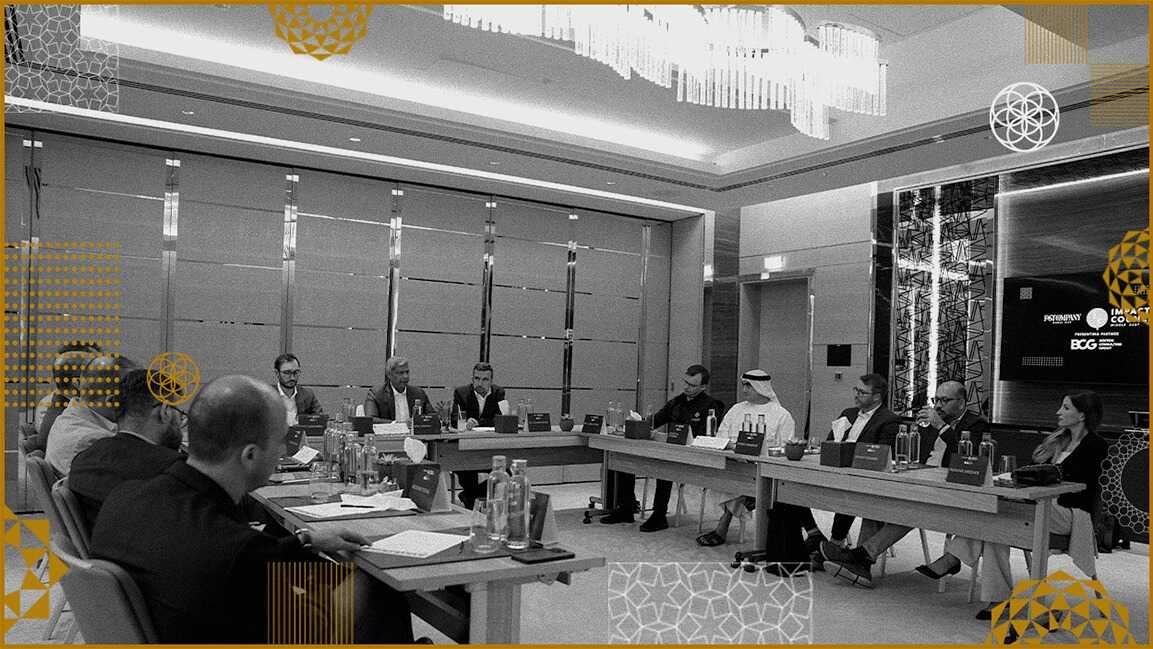- | 10:00 am
Innovation for impact. This is how Fast Company Middle East’s Impact Councils shape the future
The subcommittees bring industry leaders together to connect, collaborate, and create new opportunities

Change is only meaningful when it creates a real impact. As industries evolve and businesses rethink their role in society, one question stands out: Can innovation be truly responsible? Can ambition align with accountability?
Fast Company Middle East’s Impact Council is built to explore this challenge. By bringing together founders, CEOs, and creative business minds, it nurtures conversations that drive meaningful change. Through its subcommittees, it tackles the biggest opportunities and pressing challenges facing businesses and society today.
Subcommittee members are chosen based on their significant contributions to their respective industries, including technology, sustainability, business innovation, design, and social impact. There is no open application process; selection is done internally by Fast Company Middle East.
DRIVING IMPACT
In 2022, Fast Company Middle East’s Impact Council became a platform for industry leaders to engage in meaningful discussions on innovation and impact. Partnering with BCG, the AI subcommittee explored how artificial intelligence could drive sustainability and transform industries. For BCG, it was an opportunity to emphasize the role of Responsible AI in addressing real-world challenges. By bringing together experts and business leaders, the initiative sparked conversations that continue to shape the region’s approach to technology and sustainability.
Expanding on the success of the inaugural Impact Council subcommittee, we hosted Fast Company Middle East Impact Council’s annual meeting—an event that sparked thought-provoking discussions across multiple panels.
One explored a human-centric approach to technology, design, and business, emphasizing the need to align progress with people’s needs. Another panel focused on AI and human-machine collaboration, addressing how organizations can integrate AI responsibly to nurture trust and innovation. A session on digital transformation examined how businesses can navigate rapid technological shifts and stay competitive in an increasingly digital world.
Discussions on innovations reshaping work and life highlighted emerging technologies that prioritize human needs. Across all panels, one message stood out: Progress must align with human values to ensure sustainable and inclusive growth.
THE EXPANSION
Following the success of its inaugural subcommittee, Fast Company Middle East expanded its collaboration with BCG in 2023 to launch two new subcommittees—Artificial Intelligence (AI) and Climate Change & Sustainability.
The AI subcommittee explored how emerging technologies are transforming business and workplace culture in the Middle East. Meanwhile, the Climate Change & Sustainability subcommittee focused on strategies for companies to drive environmental progress while maintaining profitability, emphasizing the urgent need for sustainable business practices.
In 2024, the Council expanded its reach by introducing two new subcommittees: The Future of Digital Commerce and PR & Advertising.
In collaboration with Akinon, a cloud-based headless commerce platform, the Digital Commerce subcommittee examined key trends such as contextual commerce, sustainability, and AI-driven personalization. Conversations highlighted the convergence of content and commerce, the importance of digital-physical integration, and the shift toward cloud-based omnichannel platforms.
Meanwhile, the PR & Advertising subcommittee explored how AI-powered tools and data analytics transform brand storytelling. A key theme was authenticity—how brands can leverage technology while maintaining a human touch to build trust and credibility.
SHAPING THE FUTURE
As the Council moves into 2025, it is broadening its scope to address the forces shaping business and society.
Jobs and Skills in the Age of AI (in partnership with Solutions+) will explore how AI and automation reshape the workforce. This transformation goes beyond reskilling—it requires reimagining roles across HR, finance, IT, and marketing. The key to navigating these changes lies in building agile, cross-functional teams that can adapt to an ever-evolving environment.
PR, Advertising & Media will expand to include media professionals, ensuring a comprehensive industry perspective. With technology, data, and shifting audience expectations reshaping the media landscape, discussions will focus on AI-driven insights, AR/VR storytelling, and evolving content consumption patterns. As automation accelerates, one challenge remains: How can brands, publishers, and platforms maintain credibility and promote trust in an era of information overload?
Artificial Intelligence remains a core pillar of the Council. With AI expected to contribute $320 billion to the region’s economy by 2030, the conversation is shifting from experimentation to execution. As the initial buzz settles, business leaders must address critical questions: Are organizations ready for full-scale AI implementation? How can ethical and responsible AI deployment be ensured? Who is accountable for AI’s outcomes? The long-term success of AI will depend on aligning ethical frameworks, accountability, and strategic adoption across industries.
Through these initiatives, the Impact Council aims to drive meaningful dialogue, shaping strategies, and hope that innovation aligns with responsibility and long-term impact.
EXPANDING THE DIALOGUE
To further broaden the scope of discussions, the Impact Council has introduced three new subcommittees in 2025.
Travel & Tourism: This subcommittee will examine how innovation is changing travel, from regenerative tourism and smart destination management to immersive digital experiences. By bringing together industry leaders, it will encourage discussions on sustainability, personalization, and the evolving expectations of modern travelers.
Cybersecurity: With cyber threats becoming more advanced, this subcommittee will delve into the future of cybersecurity, including quantum-resistant encryption, zero-trust frameworks, and AI-driven threat detection. It will also focus on the critical role of skilled talent, cross-industry collaboration, and promoting a cyber-aware culture to ensure long-term resilience in an increasingly digital world.
Retail: As retail continues to evolve, this subcommittee will explore how brands can harness AI, data analytics, and technologies to create more personalized shopping experiences. It will also focus on the growing demand for sustainability, ethical sourcing, and transparency, addressing how retailers can build consumer trust while maintaining profitability.
Partnering with the Impact Council’s subcommittees gives brands a platform to share insights, connect with industry leaders, and stay ahead of emerging trends. Whether it’s shaping the future of retail, strengthening cybersecurity, or driving sustainable tourism, these collaborations help brands engage in essential conversations, showcase novelty, and build trust with consumers and businesses alike.







































